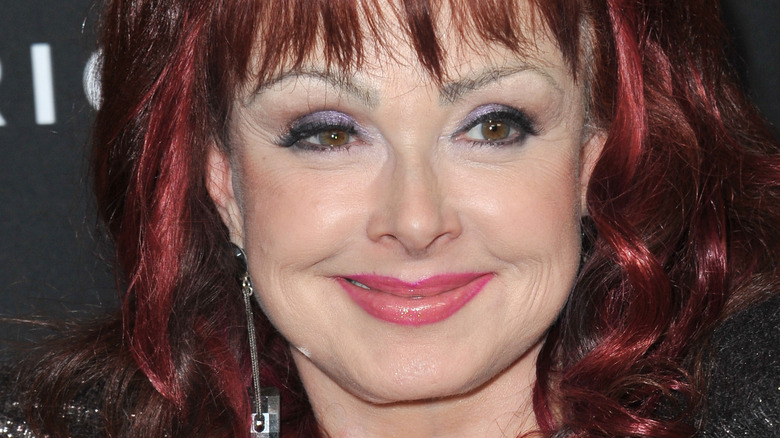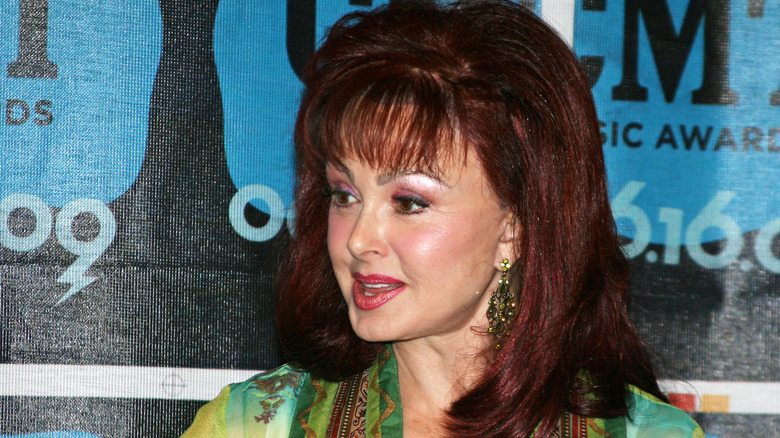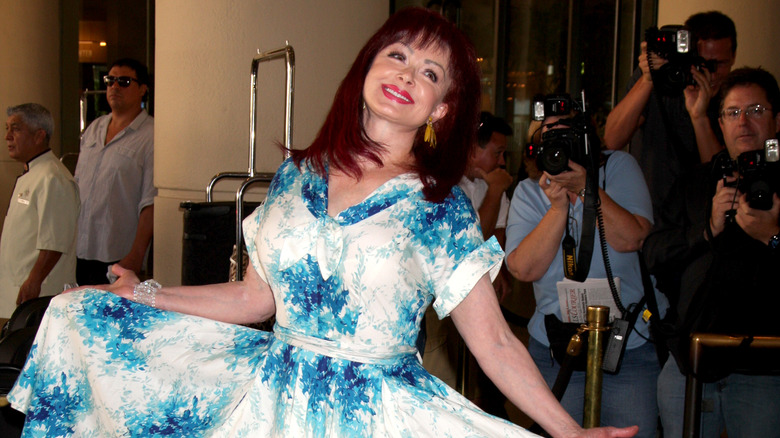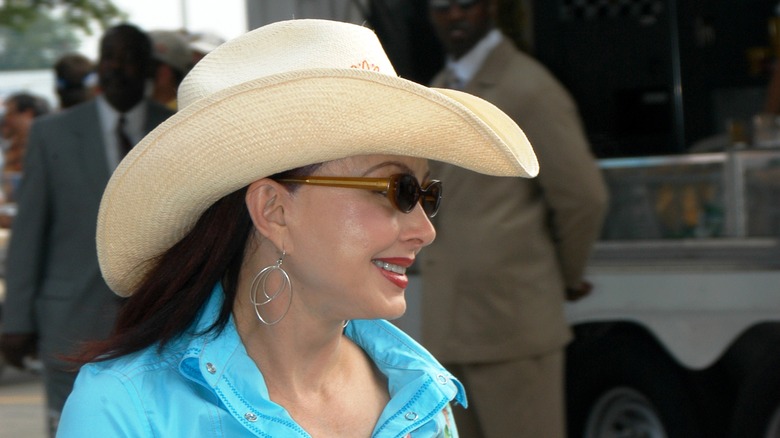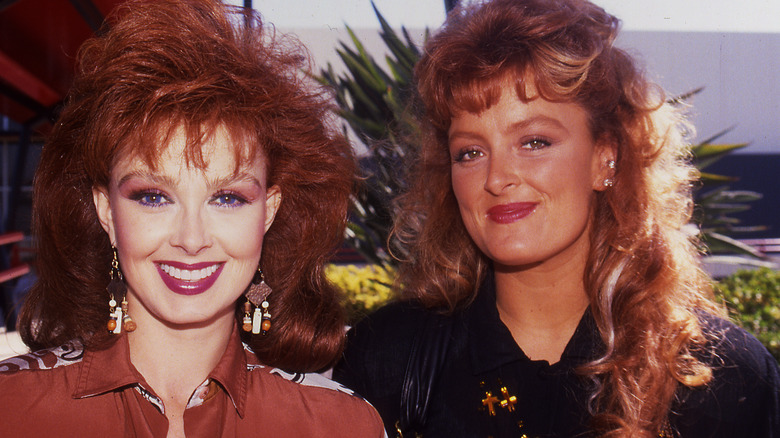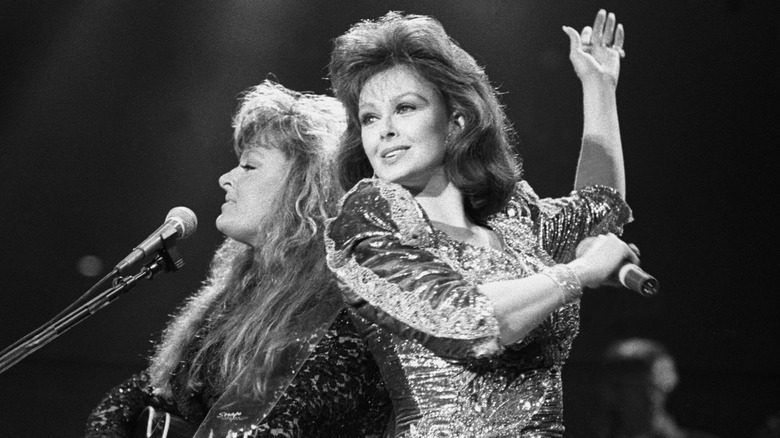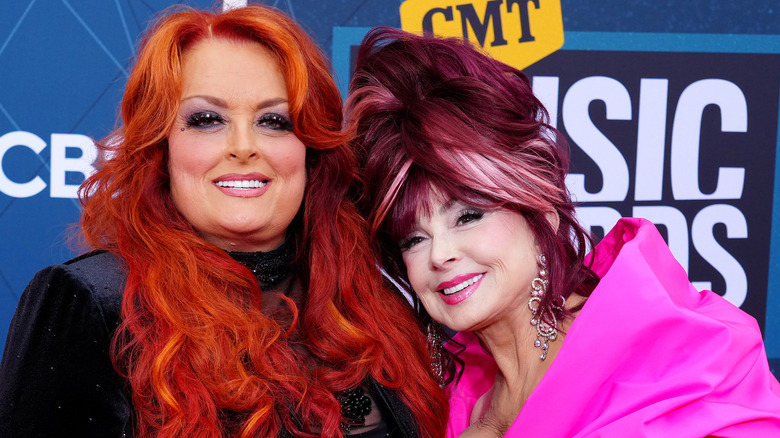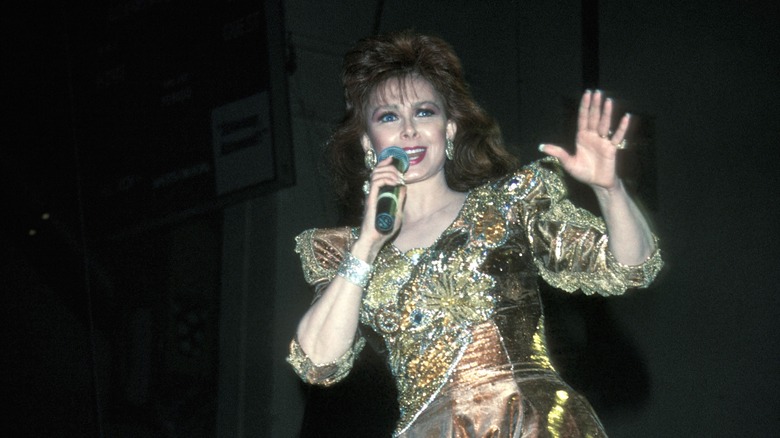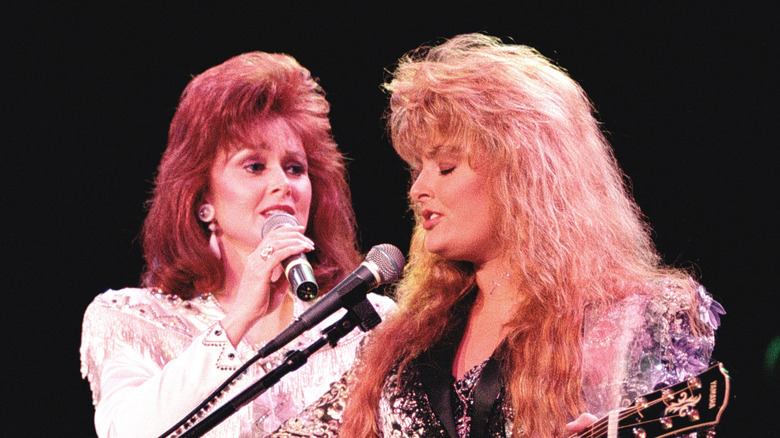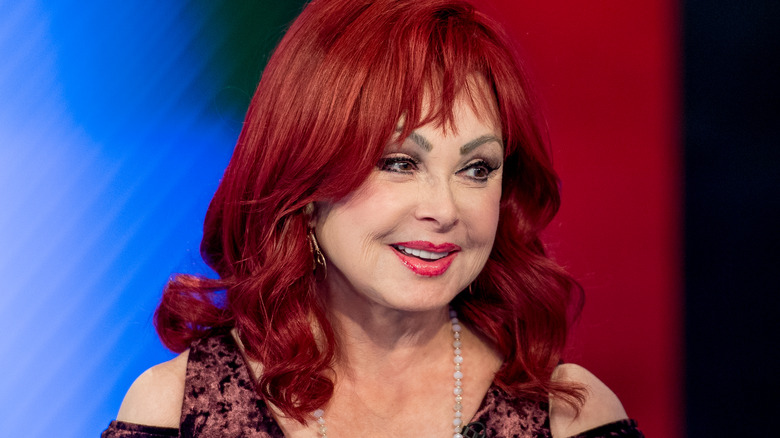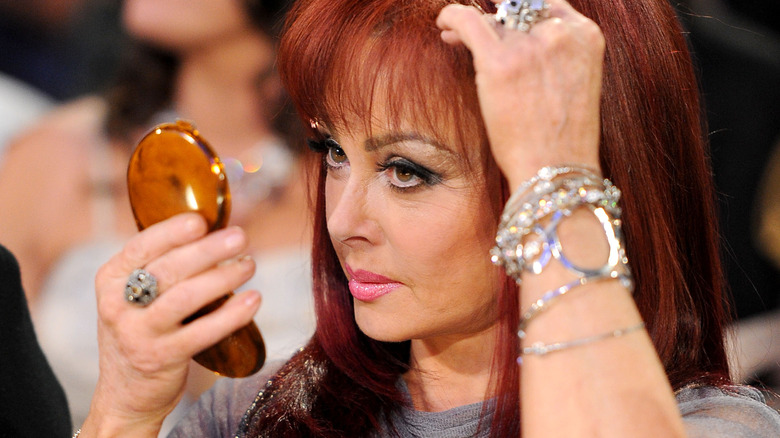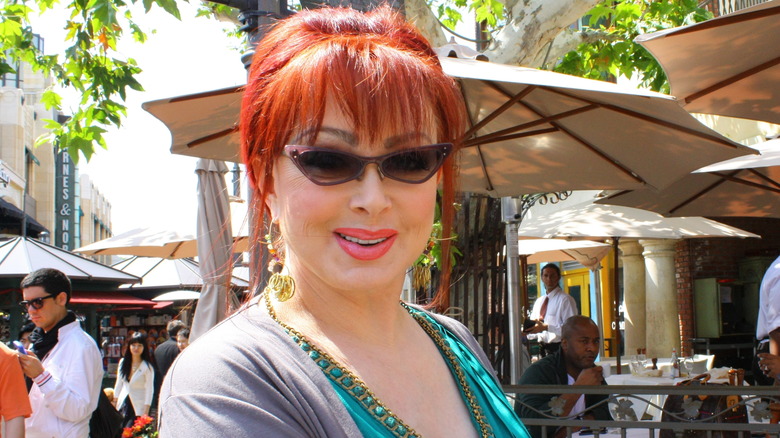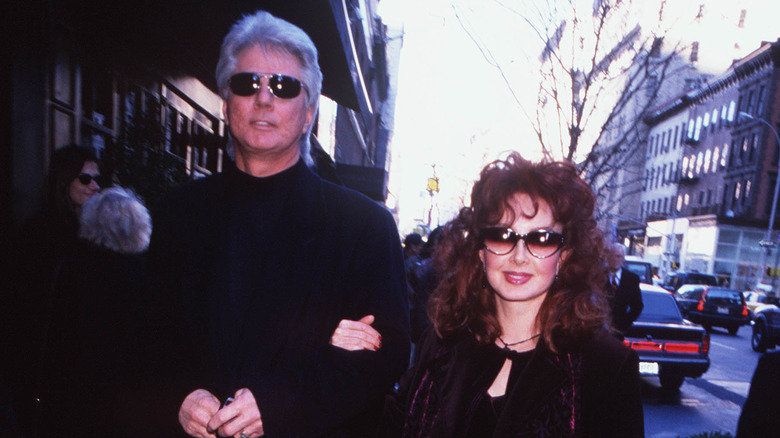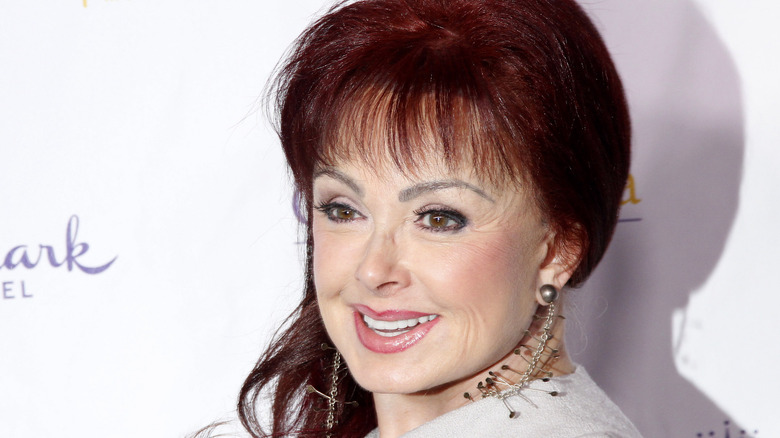The Untold Truth Of Naomi Judd
It's hard to quantify the impact that Naomi Judd had on the country music world. In the wake of her heart-wrenching death, celebrities have spoken out about her legacy and what she meant to them. According to American Songwriter, Billy Ray Cyrus and Crystal Gayle both shared their sorrow about her loss not only as a music great but also as a fellow Kentuckian. Tanya Tucker referred to Judd as her longtime buddy and spoke of her exceeding kindness and grace. And Lee Greenwood reminisced about all of his wonderful memories on stages and at awards shows with the redheaded singing sensation.
Naomi Judd remains most widely known for her incredible, though tragically short, career in the music industry. Performing alongside her daughter, Wynonna Judd, the duo garnered 14 No. 1 hits, per Billboard. These included bluesy songs like 1985's "Have Mercy" and 1987's "Cry Myself to Sleep" as well as timeless works like 1989's "Young Love (Strong Love)" and 1986's "Grandpa (Tell Me 'Bout the Good Ole Days)."
But if you think Naomi Judd's talents and interests started and ended with music, think again. She also authored books, started a cosmetics line, and made appearances in movies and television shows. Here's what you need to know about the untold truth of Naomi Judd.
Naomi Judd was country music's mama
As the country music world continues to react to the devastating news of Naomi Judd's untimely and unexpected death, one thing has become abundantly clear. In many ways, Judd represented country music's 20th-century mother, a mix of down-home country and contemporary values, per National Public Radio (NPR). Nowhere is this better epitomized than in The Judds' 1984 hit "Mama He's Crazy."
The song tells the story of a daughter explaining to her mother the intense feelings of first love. In one sense, the daughter's looking to her mom for wisdom and emotional stability. She also wants her mother's acceptance, but as the music video reveals, this proves difficult.
Flashbacks in the video depict the mother's tragic experience with love, which makes her nervous for her daughter. But at the same time, she's a modern parent who has faith in her daughter to make the right choices. It's a clear update to the country music story of how women of different generations interact. As Jewly Hight argues, "Naomi's emergence as one of the most famous mothers in country music was a revelation" (via NPR).
She was the impresario of The Judds
Besides acting as a mother-like figure within the country music world, Naomi Judd was the entertainer and impresario during her eight years of performing with her daughter, per National Public Radio (NPR). She wore full-skirted, colorful costumes and bounced around on stage telling jokes and flirting with the audience. This provided a foil to Wynonna Judd's rock 'n' roll persona, equal parts Bonnie Raitt and Elvis Presley.
Even the way they stepped out on stage proved a study in differences. Wynonna Judd came out first with a reserved manner and gravitas founded in her bluesy big voice. Against this firm foundation, Naomi Judd strutted out, twirling and waving like a Grand Ole Opry entertainer. She had the appeal of a Southern Belle without the Scarlett O'Hara melodrama. Though charming and elegant, she also had an earthy down-home charm that attested to her deep Kentucky coal country roots.
Despite their differences, both women thoroughly appreciated what the other brought to the act. On one live album, Naomi Judd remarked of her daughter, "Excuse my language, but she's a badass." As for Wynonna Judd, she declared her mother "the queen of everything." Fitting words for a woman who owned the stage and every part of their performances while still making room for her daughter to shine as the star.
Naomi Judd remained a Kentucky girl at heart
Naomi Judd was born in Ashland, Kentucky, on January 11, 1946, to Charles Glen Judd, a gas station owner, and Pauline Ruth Oliver, a homemaker, per the New York Times. Situated along the Ohio River, Ashland sits just below the Big Sandy River's mouth, forming an industrial complex with two neighboring cities (via Britannica). In existence since 1815, the town has long represented a center of coal and timber production.
Judd inherited the rich culture of Appalachia including its song traditions. But this heritage proved mixed as Ashland, Kentucky, also enjoys notoriety as one of the most depressed areas of the country in terms of mental health, per Business Insider. Thirty-two percent of locals have depression diagnoses. Researchers believe poor economic conditions have contributed to these mental health issues, and Judd experienced these conditions firsthand growing up. Sadly, Naomi Judd also suffered from the area's preponderance towards depression, according to CBS News.
Her career made Tennessee a more convenient home, and she lived there for more than 20 years, per Williamson Home Page. But blood is thicker than water, and this proves just as true when it comes to homelands. Despite the problems with Kentucky (via Taste of Country), Judd always found reasons to visit her home state. She remained a celebrated hometown girl throughout her career, returning to raise money for charities, as reported by Kentucky Today.
She had Wynonna Judd at 17
Naomi Judd was a star student in high school who had college ambitions, per the New York Times. But after briefly dating a football player named Charles Jordon, she became pregnant, and her life changed forever (via MSN). When Jordon learned of the pregnancy, he refused to accept responsibility for his daughter. This was an untenable situation in 1964, leaving Judd pressured to marry another classmate, Michael Ciminella. Judd gave birth to Wynonna Judd in June of that year, which meant foregoing high school graduation.
By 1968, the young family relocated to Los Angeles, California, and had a second daughter, Ashley Judd. But the union proved flawed from the beginning, and the couple divorced by 1972. Naomi Judd remained determined to make it as a single mom. Amazingly, she juggled nursing school and raising two daughters alone. Various jobs along the way included modeling and waitressing.
But California didn't feel like home and an altercation with an ex-boyfriend sealed the deal. She packed up her kids and moved back to Kentucky, taking up residence in Morrill, a town with one main road and 50 residents. Foregoing basics like television and a phone line, Wynonna Judd recalled, "If we didn't make it or grow it, we didn't have it," per PBS. To pass the time, Judd and her eldest daughter sang together in the evenings. The rest is history.
Naomi Judd wasn't her real name
Although everyone knows The Judds as Wynonna and Naomi, these weren't their original names (via a Taste of Country). Naomi Judd was christened Diana Ellen Judd, and after marrying Michael Ciminella, she took his last name. She named her firstborn Christina Claire Ciminella. But once the marriage dissolved, Judd wanted her maiden name back, and she didn't want to stop there. Diana didn't fit her identity, so she looked to the Bible for a little inspiration.
She went with Naomi, the mother-in-law of Ruth, and this name change proved eerily prophetic. The Biblical Naomi lost her husband and both of her sons while living in a foreign land. After deciding to return to her homeland of Bethlehem, she bid her daughters-in-law farewell. While Orpah chose to return to Moab, Ruth refused to leave her mother-in-law, swearing to follow her to her new home.
Although the details of Naomi Judd's life proved somewhat different, after she and Wynonna Judd made it big in country music, it forced an equally difficult choice. She left her younger daughter, Ashley Judd, with her ex-husband while the red-headed duo toured. It's also worth noting that these name changes came before stardom, so they represent more than stage names. In Naomi Judd's case, the rechristening signified her role as a mother and her deep Kentucky roots in the heart of the Bible belt.
She had a unique relationship with her daughter
The Judds had a unique chemistry on stage fueled by their highly contrasting personalities, according to NPR. While Wynonna Judd brought an unforgettable voice and musical talent to the group, she proved a bit shy and reserved on stage. Naomi Judd provided rich harmony, willing to take a back seat to her daughter's soulful melodies. She rarely sang above Wynonna Judd, preferring to deepen and bolster her daughter's voice.
But when it came to show-stopping antics, heartfelt storytelling, and folksy charm, nothing beat Naomi Judd. She turned each performance into a truly entertaining experience that won over fans and kept people glued to their shows. In other words, the women's divergent strengths complemented each other beautifully.
Of course, the vast differences in their personalities could also prove troublesome at times, as reported by PBS. Music was one of their only outlets. Before making it big, they faced crippling poverty, which relegated them to purchasing bargain bin recordings. But this worked to their advantage. By learning the songs of the past, many of them coal mining ballads straight out of the heart of Appalachia, Naomi Judd introduced her daughter to the history of country music. Exploring this musical heritage provided a common ground: "Wynonna and I couldn't talk to each other, but, lo and behold, we could sing together."
She was a nurse before she became a superstar
Before making it big in Nashville, Tennessee, Naomi Judd led a hard-scrabble life as a single mother working any job she could to keep the family afloat. Returning to Kentucky gave her the chance to attend nursing school in Berea, as reported by PBS. It also allowed her and her daughters to eventually move to Tennessee where she worked as a registered nurse in the intensive care unit (ICU) for a handful of years, according to the Lubbock Avalanche-Journal.
In 1991, Naomi Judd retired prematurely from country music's favorite duo, her body failing due to a hepatitis C diagnosis (via The Washington Post). Her nursing career came back to haunt her as she'd contracted the disease years earlier after accidentally getting pricked by a used needle.
Speaking to an audience of nurses in Morristown, New Jersey, she explained, "When I was told I had hepatitis C, I was on top of the world, selling out arenas. Then, I was told I had three stinkin' years to live," per the Daily Record. The shock of this news left her reeling and with the feeling she'd been medically cursed.
Working as a nurse helped The Judds get discovered
Working as a nurse proved a bittersweet aspect of Naomi Judd's life. Because of her time in the medical field, she always fostered a comradery with other nurses, and the profession allowed her to support her family as a single mother (via the Daily Record). Although it would eventually be the reason her musical career got cut short, it also provided The Judds their initial entrée into the country music world.
Naomi Judd was the first person to recognize her daughter's incredible vocal talents, and she didn't hesitate about what to do (via PBS). Her registered nursing license allowed her to move the whole family to Nashville, Tennessee. Eventually, through one of her patients, she secured a live audition at RCA. She and Wynonna Judd performed for producer Tony Brown and studio head Joe Galante. At the time, Wynonna Judd was just 18 years old.
Despite their inexperience performing in front of others, the duo impressed RCA. Two hours later, they walked out of the audition as The Judds with a contract in hand. The duo released their first album in 1984 called "Wynonna & Naomi," and it quickly shot to the top of the charts.
Naomi Judd opened up about depression
Over the years, Naomi Judd opened up about the depression she struggled with, as reported by CBS News. Describing her mental illness as life-threatening, she noted that fans never suspected this side of her life "because they see me in rhinestones, with glitter in my hair. That really is who I am. But I would come home and not leave the house for three weeks, and not get out of my pajamas. It was really bad."
Judd's forced premature retirement in 1991 didn't help. Over the years, she occasionally went on the road with Wynonna Judd on short tours. But after these brief episodes ended, she felt catapulted back into depression and suicidal thoughts, according to the New York Post. One of her worst episodes of depression occurred after completing the Last Encore Tour in 2012 (via People).
At her worst, the singer's depression contributed to extreme panic attacks, not remedied by heavy medication. To get better, she turned to various therapies and even spent time in psychiatric facilities. But to no avail. To add to her spiraling feelings of grief, memories she'd suppressed since early childhood sprang to the surface. They involved her great uncle sexually abusing her as a child, which devastated her.
If you or someone you know is struggling with mental health, please contact the Crisis Text Line by texting HOME to 741741, call the National Alliance on Mental Illness helpline at 1-800-950-NAMI (6264), or visit the National Institute of Mental Health website.
She launched her own skin care line
After retiring from The Judds, Naomi Judd struggled to find purpose in her life and a new identity apart from the one she'd crafted onstage. Inevitably, this led her to explore some of her other interests. Dolly Parton alluded to one of these in an Instagram following Judd's death, "Naomi and I were close. We were very similar. We were the same age and both Capricorns. We loved big hair, makeup, and music" (via ABC 6). It would be the love of makeup that helped Judd forge new paths after leaving The Judds.
According to Women's Wear Daily, Naomi Judd started her cosmetic company Naomi, creator of the Esteem Skin Care line, in 2003. The line was developed in collaboration with Judds' dermatologist, Melvin Elson, and biochemist Dr. Sergio Nacht. By 2004, the company boasted $9 million in sales, according to Cosmetic Designs.
In 2005, Southern Cosmetics began promoting and distributing the Esteem Skin Care line from Naomi cosmetics, according to Cosmetic Designs. This partnership meant the expansion of the brand as it received a new boost in advertising.
Naomi Judd was forthright with her fans
While Wynonna Judd valued her privacy and often chided her mother for being too honest and revealing in interviews, Naomi Judd shared the struggles of her life openly with fans (via The New York Daily News).
After therapy sessions revealed that Naomi Judd's first childhood memory was of sexual abuse, the 65-year-old singer opened up about it for the first time in "The Judds," a documentary series. Wynonna Judd reported feeling uncomfortable finding out about this personal information about her mother for the first time during filming. While Wynonna Judd lauded her mother for speaking out to help others, the revelation of these childhood hurts took a toll on Naomi Judd.
One of the last people to speak with Naomi Judd was the journalist Hunter Kelly. In an article for Rolling Stone, Kelly described their get-together and how encouraged she felt to see Naomi Judd preparing for another tour with The Judds. Kelly now realizes that she overlooked much in that conversation: "Now I have no choice but to stop and really listen to what Naomi was saying and realize the [planned] tour and the fame and the Country Music Hall of Fame induction were not the panacea I thought they were for her."
If you or someone you know may be the victim of child abuse, please contact the Childhelp National Child Abuse Hotline at 1-800-4-A-Child (1-800-422-4453) or contact their live chat services.
She married one of Elvis' backup singers
On May 6, 1989, Naomi Judd married Larry Strickland in a ceremony at Nashville's Christ Church with both daughters serving as bridesmaids, according to The Boot. Wynonna Judd also officiated over the ceremony along with Don Potter, a member of The Judds' band.
The wedding launched Naomi Judd's second foray into domesticity, and the couple was still going strong three decades later. Sadly, Naomi Judd died just a few months before their 33rd wedding anniversary. During her lifetime, when asked about the success of her marriage, Judd attributed it to similar backgrounds: "Larry and I are both from a family of six, very blue-collar. He worked in the tobacco field every summer. My daddy had his own gas station and taught me the hard work ethic. Larry is the most humble person I've ever met" (via The Boot).
But they shared more than a similar socioeconomic past. The two also loved music and singing. As People reported, Strickland enjoyed a musical career as a backup singer for Elvis.
Naomi Judd was a renaissance woman
Although Naomi Judd would forever be synonymous with The Judds, she represented a true renaissance woman. Highly successful in a variety of endeavors, she explored wide-ranging passions. For example, she was a prolific author. She wrote three children's books, as well as 1995's "Love Can Build a Bridge," 2004's "Naomi's Breakthrough Guide," and 2016's "River of Time: My Descent into Depression and How I Emerged with Hope," as reported by People.
But her talents didn't end there. According to People, she spent two years hosting "Naomi's New Morning" on the Hallmark Channel from 2005 through 2007. She also returned to the channel for appearances on "Home & Family," including holiday specials.
What's more, she worked on the — as of her death unreleased — Fox-led docu-series the "Icon" project, per Movie Web. The project highlights some of the biggest names in music, and Naomi Judd served as an executive producer of the show along with Wynonna Judd. According to Variety, the first season of the project was set to showcase The Judds. As of this writing, there's no word on whether this will change in the wake of Naomi Judd's unexpected death.
